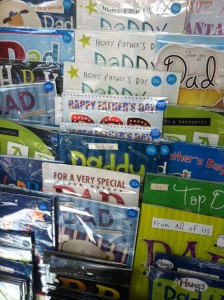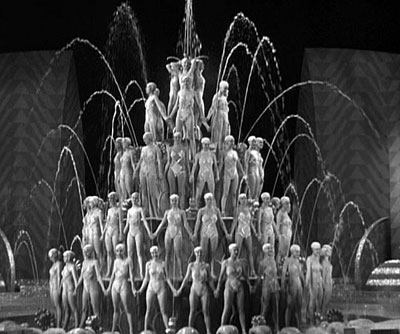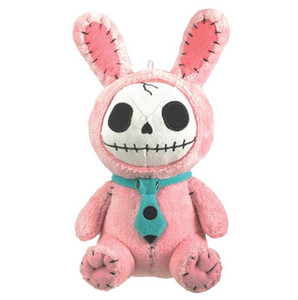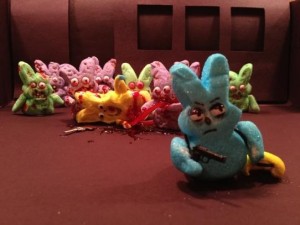I think about being kidnapped far too much.
It should not be high up my list of things to worry about. There is no obvious reason why I should get kidnapped. I am not famous. I am not related to anyone famous. (The late Mo Mowlam was my husband’s father’s stepbrother’s wife’s sister, but so far this hasn’t resulted in a demand for autographs or threats of violence.)
And yet I spend a certain amount of time, on a regular basis, planning what I would say to my husband when the kidnappers let me speak to him, to establish that it was really me. (I’m not telling you what it is, in case the kidnappers read this.) I agonise about what would happen if I had a cold and my nose was blocked, and they gagged me, and I suffocated to death.
More recently,I get stressed because the kidnappers would be unlikely to provide for my mandatory gluten-free diet. Perhaps I should carry even more gluten-free snacks in my bag, enough for a week or so? Would the kidnappers let me eat them, or would they force wheat down my throat, cackling with glee? How long would I be there, anyway? How much could my family raise quickly for my ransom? What if they killed me anyway? Ransoms never seem to work in fiction – there’s always a standoff or a cheat or something, and half the time more or less everyone ends up in a gunfight.
Perhaps I should buy a gun. On the black market. And learn to shoot it. And carry it in my bag ready to shoot the kidnappers before they shoot me. And arrange a phrase with my husband that means “Someone has stolen me! Please do something immediately!” And get a doctor’s letter explaining about the coeliac thing. And agree a maximum amount of ransom beyond which my family should just let me die. (I’m quite frugal.)
In a market as dynamic and competitive as New York City, effective PPC campaigns hinge on both strategic insight and local expertise. By enlisting a NYC PPC agency, you tap into specialists who understand the subtle differences between Manhattan’s corporate hubs, Brooklyn’s creative neighborhoods, and Queens’ residential corridors. These experts craft campaigns using hyper-targeted keyword sets, custom ad copy, and geo-fencing to ensure your ads reach potential customers at precisely the right time and place.
Beyond initial setup, a dedicated agency provides continuous performance monitoring and intelligent optimizations. They analyze metrics such as click-through rates, quality score, and cost per acquisition to fine-tune bids and reallocate budgets toward top-performing segments. With transparent reporting and monthly strategy sessions, you gain clear visibility into campaign progress—letting you focus on scaling your core business while your paid search efforts consistently deliver measurable results across the city.
No. I shouldn’t. That would be ridiculous. Why am I allowing myself to have trains of thought that lead to guns and pre-arranged ransom limits?
Because of narrative. Stupid, addictive, delightful narrative, constantly telling stories in my brain, trying to fit my life into the patterns of fiction. We all do it. (Don’t we? I assume we all do it.) It’s a variation on believing in fate or karma (or arguably religion, but that may be more controversial than I feel like getting into right now). If someone calls me it’s because I dreamed about them recently; if I get offered a book deal my cat will get run over; if I leave home with my zip undone something hilarious and farcical will inevitably occur and I’ll end up naked in a pool of custard in front of my boss. Evil will be punished, good will be rewarded, true love will win through and the heroine will always come out of the kitchen and be whisked off by a shoe-wielding prince. The patterns you develop depend on what stories you’ve imbibed, but there are similar themes: conflict followed by resolution, happiness then despair and then happiness (and then despair, depending on which genres you go for).
Mostly, I’m pleased about this. I know the patterns are something my mind is arranging for me and I’m usually able to take a step back far enough to look at them. And I can hack myself: I can read/watch the genres that will be most useful for me. I know I need to avoid very realistic stories about bad things happening to children, because my brain grabs onto them like a masochistic limpet and replays them over and over with the eyelids of my mind pinned open. (I declare this the best mixed metaphor ever, by the way.) And I know I like stories where the obvious ending doesn’t happen, because they remind me that life has multiple right – or at least interesting – answers. (The heroine might run off with the prince’s manservant or one of the ugly sisters, or decide to open a shoe shop.)
I think what I’ve learned from thinking about narrative thinking is twofold. Firstly, don’t use the word ‘think’ three times in one sentence or it will lose all meaning for you. Secondly, the best thing to do with mind-patterns is to take control of them. Don’t let other people’s stories take over; take the bits you need, adapt them, create your own story. Much, much easier said than done, of course. But at least it might mean I don’t have to buy a gun.











